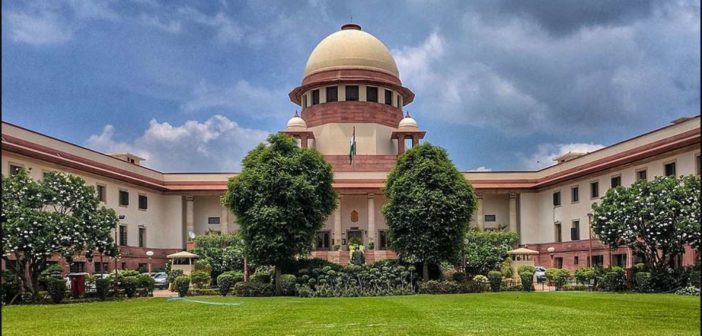In this edition of Court judgements review, we shall look at the Supreme Court’s judgement on bribery and legislative privileges, overriding provisions of Food Safety and Standards Act over the IPC, Calcutta High Court’s judgement on addressing an unknown woman as ‘Lady’, differentiating employees for the purpose of maternity leave, and Madras High Court’s judgement on breakdown of marital relationship.
Supreme Court: Corruption and bribery of members of the legislature erode the foundations of Indian Parliamentary democracy, creating a political system that denies citizens a responsible, responsive, and representative form of governance.
In Sita Soren vs. Union of India, the seven-judge bench of the apex court headed by the Chief Justice, overturned the judgement of the five-judge bench, popularly known as ‘1998 PV Narasimha Rao’ Judgement, and held that the members of legislatures do not enjoy immunity from prosecuting a legislator accused of accepting bribes in exchange for voting or speaking. The brief facts of the case are as follows.
PV Narasimha Rao judgement of 1998: In the 1991 general elections for the Tenth Lok Sabha, Congress (I) emerged as the largest party, forming a minority government with PV Narasimha Rao as Prime Minister. A motion of no-confidence was brought against the government, requiring support from fourteen members to defeat it. The motion was rejected with 251 members voting in favour and 265 against it. Members of Parliament affiliated with the JMM, and the Janata Dal (Ajit Singh) Group voted against the motion, with one JD (AS) member abstaining. Allegations were made to the Central Bureau of Investigation claiming a conspiracy among these members to accept bribes for their votes. Accusations were also levelled against PV Narasimha Rao and other MPs for facilitating these bribes. Upon subsequent court proceedings, the five-judge bench of the apex Court, by 3:2 majority, upheld that Parliamentarians are granted immunity under the Constitution from criminal prosecution regarding their speech and votes within the House.
The majority judgement held that the alleged bribe-takers who voted against the no-confidence motion were shielded from prosecution in a court of law by Article 105(2) of the Constitution, which grants immunity to MPs for their speech and votes in Parliament. This immunity is separate from the freedom of speech outlined in Article 19, ensuring MPs can express themselves freely without fear of legal consequences.
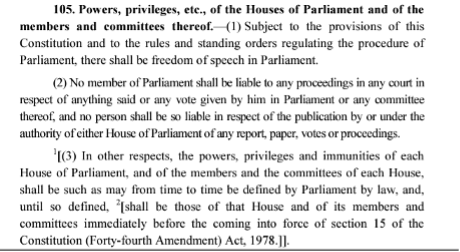
The minority judgement, by S.C. Agarwal, argued that neither the bribe-takers nor the bribe-givers were protected by Article 105(2). He emphasized that MPs cannot claim immunity for offences involving bribery for their speech or votes, as it would undermine the rule of law and the principles of parliamentary democracy. Additionally, interpreting “in respect of” broadly could lead to contradictory outcomes, where MPs could be prosecuted for accepting bribes to refrain from speaking or voting, but not if they accepted bribes to influence their speech or vote. This interpretation likely contradicts the framers’ intentions and the spirit of the Constitution. Article 105(2) immunity shields MPs from liability for actions directly resulting from their speech or vote, not for actions that occurred before the speech or vote, and independently lead to liability.
The current case has been sent to a seven-judge bench from a five-judge bench, which was initially referred to them by a three-judge bench. This referral stemmed from an appeal against the judgment of the Jharkhand High Court, which dismissed Sita Soren’s plea. Soren was accused by the CBI of allegedly accepting a bribe to vote for a specific candidate in the Rajya Sabha elections.
The Attorney General argued that the judgement of PV Narasimha Rao case is inapplicable to the present case as the exercise of franchise by an elected member of the legislative assembly in a Rajya Sabha election does not fall within the ambit of Article 194(2). The Counsel for the appellant argued that certain legislative procedures, like ad-hoc committees and elections, although not conducted on the House floor during sessions, still constitute essential legislative processes.
Upon hearing the submissions, the seven-judge bench held that the scrutiny of privileges revolves around whether they are essential to uphold the integrity of legislative functions. Privileges should not be seen as goals in themselves but rather as tools necessary for the effective operation of legislative duties. The extent of privileges enjoyed by a House and its members should be assessed based on their necessity for the smooth functioning of the House. Members cannot use their privileges as a shield to evade ordinary criminal laws.
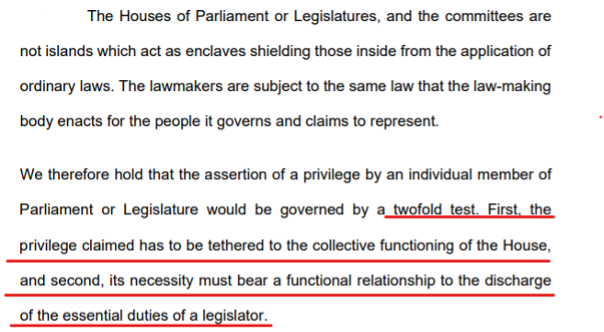
The apex court further held that the majority judgement in the Narasimha Rao case did not delve into when the offence of bribery is complete or the constituent elements of the offence. Instead, it created an artificial distinction whereby the performance of the promise was made relevant to attract the offence of bribery.
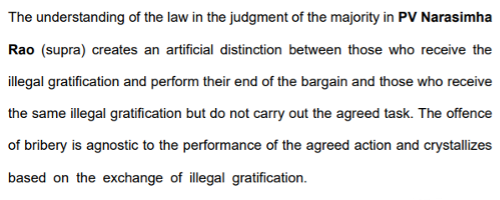
Further, on the question of whether the elections to Rajya Sabha are covered under the privilege, the apex court asserted positively. It held that Article 194 deliberately employs the term “Legislature” instead of “House” to encompass parliamentary activities that extend beyond the House floor or traditional law making processes. The protection provided by Articles 105 and 194 is commonly referred to as “parliamentary privilege” rather than “legislative privilege” because it encompasses more than just law making activities on the House floor. It extends to various powers and responsibilities of elected members within the Legislature or Parliament, even when the House is not in session.
Accordingly, the apex court held that the act of bribery is complete when a legislator accepts a bribe, and such bribery is not protected by Article 105(2) or its equivalent in Article 194. The court reasoned that engaging in bribery is a separate criminal act unrelated to the casting of a vote or the decision on how to cast it. Therefore, an individual legislator cannot claim privilege under Articles 105 and 194 to seek immunity from prosecution for bribery related to their legislative activities. This claim fails the two-part test, as it is not connected to the collective functioning of the House and is not necessary for fulfilling the essential duties of a legislator.
Interestingly, the National Commission to Review the Working of the Constitution also recommended changes in a similar manner as below.
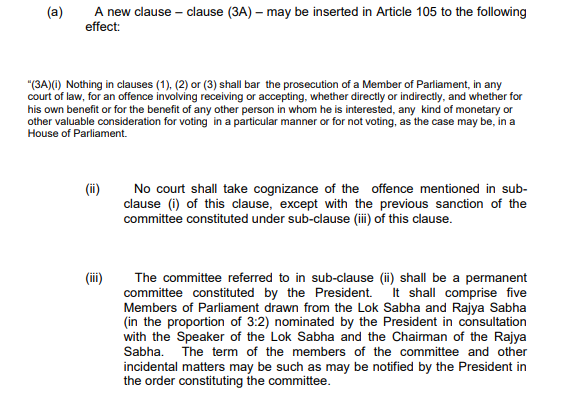
Supreme Court: Provisions of Food Safety and Standards Act overrides provisions of any other law; no question of simultaneous prosecutions under two laws.
In Ram Nath vs. The State of Uttar Pradesh & Ors., the apex court held that the provisions of the Food Safety and Standards Act (FSSA) will override regardless of any conflicting provisions in other laws currently in effect, in this case, the Indian Penal Code.
The apex court was hearing an appeal against the judgement of the High Court that declined to quash an offence punishable under Sections 272 and 273 of the IPC. The allegations are that the appellant operated a business selling mustard oil without possessing the required license and had adulterated mustard oil, edible oil, and rice bran oil.
Brief facts of the case are as follows. On 11 May 2010, the State of Uttar Pradesh authorized authorities to initiate prosecutions under Sections 272 and 273 of the Indian Penal Code (IPC), as well as under the Prevention of Food Adulteration Act, 1954. Subsequently, on 28 August 2010, a First Information Report (FIR) was filed by a food inspector, representing the Regional Food Controller, Agra, against the petitioner, accusing them of committing offences under Sections 272 and 273 of the IPC. The applicant relied on M/s. Pepsico India Holdings (Pvt) Ltd. & Anr vs. State of Uttar Pradesh & Ors, where it was held that starting from 29 July 2010, when the Food Safety and Standards Act (FSSA) came into effect, its provisions would supersede those of other food-related laws, including Sections 272 and 273 of the Indian Penal Code (IPC).
The counsel for the state argued that while an offender can be tried under different laws, they cannot be punished twice for the same offence. If an act constitutes an offence under two laws, the offender may be prosecuted under either or both, but not punished twice. The Indian Penal Code (IPC) and the Food Safety and Standards Act (FSSA) operate in distinct areas, making them mutually exclusive. The appellant argued that Section 5 of the IPC states that special laws remain unaffected by its provisions, and since the FSSA is a special law, it supersedes the IPC in areas covered by its provisions.
Having considered the submissions, and the respective provisions under both statutes, the apex court held that the FSSA contains comprehensive provisions for dealing with offences related to unsafe food. Section 89 of the FSSA indicates an overriding effect over all laws related to food, but its main section specifies that its provisions prevail over any inconsistent provisions in any other law currently in force, without limitation to food-related laws.
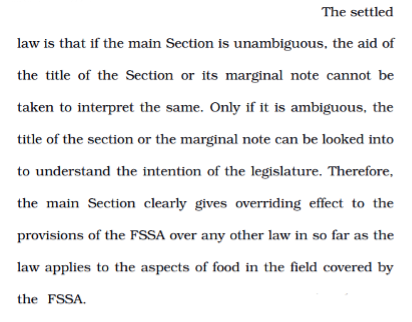
Accordingly, the offences under IPC are quashed and set aside.
Calcutta High Court: Addressing an unknown woman on the street with the term “darling” is clearly offensive and constitutes a sexually coloured remark.
In Janak Ram vs. The State, the Calcutta High Court held that using a sexist expression ‘darling’ can attract sentence under Section 354A and Section 509 of the IPC. The court further said that prevailing standards of society do not permit men to gleefully use such expression in respect of unacquainted women.
The single bench of the High Court, comprising Justice Jay Sengupta, was hearing an appeal against the Additional Sessions Court order that upheld the sentence of the Judicial Magistrate. The counsel for the state argued that during the eve of Durga Puja, a police team responded to reports of a person causing a disturbance. Upon apprehending the individual, some officers stayed in the area while others took the person to the police station. It was alleged that during this time near a shop, the accused directed a sexually indicative question at the complainant-victim. Subsequently, the accused were arrested and tried, resulting in their conviction and three months of imprisonment for each offence.
The counsel for the appellant argued that the timing of the incident was unclear and that an independent witness testified that the remark was made jokingly, thus challenging the application of Sections 354A and 509 of the IPC. They also suggested a clash of egos and questioned the credibility of the incident due to a lack of independent witnesses and poor lighting in the area. Additionally, they contended that the word used was not inherently sexually suggestive but rather colloquial and commonly used.
Upon hearing the arguments from both sides and the provisions of Section 354A and 509 of the IPC, the court ruled that the remark constituted an offence regardless of the accused’s state of intoxication. It emphasized societal standards and noted discrepancies in the testimonies, ultimately concluding that the prosecution had proven its case beyond a reasonable doubt, dismissing the argument that the remark was made in colloquial manner.
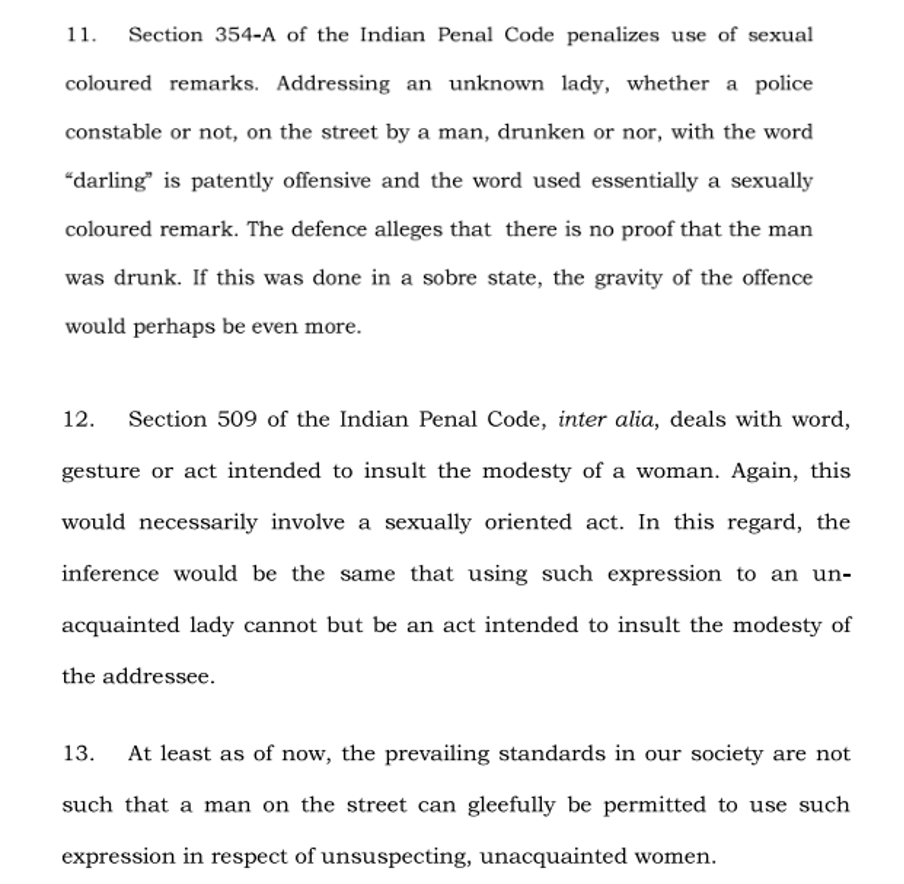
Accordingly, the judgement was upheld, and since the appellant did not further aggravate the act, his sentence was modified to one month for committing each of the offences instead of three for each.
Calcutta High Court: No differentiation is permissible between regular and contractual employees in extension of maternity benefit.
In Neeta Kumari vs. Union of India & Ors, the Calcutta High Court held that non-extension of the benefits of maternity constitutes a discriminatory act and is not permissible. Such discrimination is akin to creating a class within a class, which is violative of Article 14 of the Constitution.
The Single judge bench comprising Justice Raju Basu Chowdhury was hearing a plea questioning the failure on the part of the respondent to allow maternity leave with pay to the petitioner for 180 days. Brief facts of the case are as follows. The petitioner, appointed as an Executive Intern at the Reserve Bank of India (RBI) on a contractual basis for three years starting 16 August 2011, applied for maternity leave on 20 November 2012, for six months, starting 3 December |2012, due to pregnancy-related health concerns. However, the RBI informed her on 14 March 2013, that she was not entitled to maternity leave under the contract terms but could take unpaid leave while retaining medical benefits.
The counsel for the petitioner argued that the Maternity Benefits Act, 1961, overrides the contract terms, as it’s a beneficial legislation, and Section 21 of the Act gives it precedence over other laws, including employment contracts. She acknowledges having accepted the contract terms but asserts that the Maternity Benefits Act supersedes them. The counsel for respondents contends that the RBI’s code of conduct for limited-term contract employees doesn’t include maternity leave provisions or apply the Master Circular of 1 July 2011, which provides for such benefits. Additionally, the RBI argues that it doesn’t fall under the Act’s definition of an “establishment.”
Upon hearing both sides, the court held that the Maternity Benefits Act does not discriminate based on whether an establishment is governed by state or central statutes. Section 2(b) of the Act states that it applies to any shop or establishment as defined by state laws where ten or more persons are employed. The Supreme Court had previously ruled that maternity benefits under the Act are not limited to the duration of employment but can extend beyond it and the terms of the petitioner’s employment do not negate her entitlement to benefits under the Act.
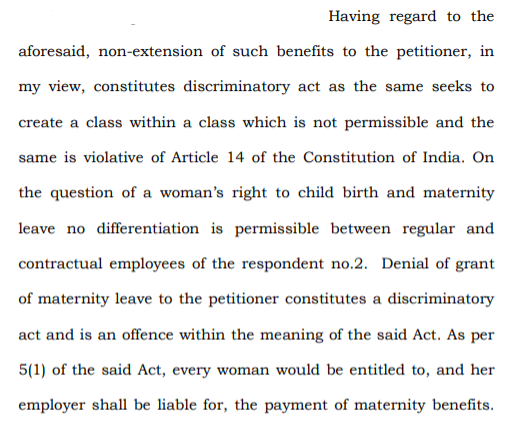
Accordingly, the respondents are directed to afford compensation in the form of leave with pay to the petitioner, for the period for which the same was denied. The petition was disposed of.
Madras High Court: When both spouses engage in a continuous cycle of verbal abuse, criticism, and disrespect towards each other and their family members without showing any remorse, it is not worthy to retain their marital relationship.
In ABC vs. XYZ, the Madras High Court held that given the ongoing conflict involving verbal abuse, vulgar criticism, and a lack of remorse from both the appellant/husband and respondent/wife, it is deemed unfit to continue their marital relationship. Therefore, considering the relationship has become futile and burdensome, it is appropriate to dissolve the marital tie.
The two-judge bench comprising Justice G. Jayachandran and Justice C. Kumarappan was hearing an appeal against the decree of the Family Court, Srivilliputhur, that dismissed his divorce petition. Brief facts of the case are as follows. The couple got married on 3 November 2017, at Pethavanallur Arulmigu Mayuranathaswamy Temple, Rajapalayam. Traditional gold jewellery was exchanged according to customs. They initially lived in Chennai, where the wife ran her own business. However, the husband took a job abroad in January 2018, leading to frequent separations. The relationship deteriorated, with both parties making serious allegations against each other, culminating in a criminal complaint by the husband alleging harassment by the wife. The wife countersued, accusing the husband and his family of demanding dowry and subjecting her to cruelty. The husband claims the marriage is irretrievably broken due to mental cruelty by the wife, while the wife alleges mistreatment by the husband and his family, including a miscarriage due to physical abuse. The exchange of accusations escalated, demonstrating a lack of willingness to reconcile.
Upon hearing the submissions from both sides, the court noted the parties’ education level and the severity of their conflicts, finding no possibility of reconciliation after five years of separation. Additionally, suspicions of infidelity further weakened the chance of reconciliation. Ultimately, both parties were found equally responsible for the breakdown of the marriage and for causing each other mental cruelty.
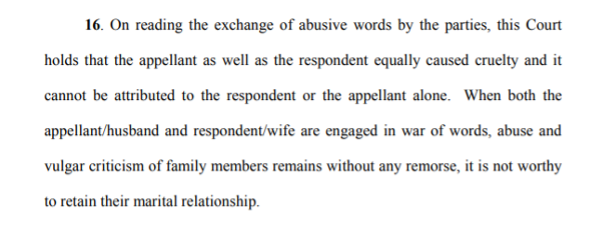
Accordingly, the court held that the marital bond, as a cumulative effect of the cruelty inflicted by both parties, has become futile and devoid of value, and hence must be dissolved. The decree for divorce is granted accordingly.


